|
Recent Articles |
|
||
The German Revival
The
1990’s were not kind to Germany. No it wasn’t the climate; it was the
market. The export share collapsed and their wine icons were in serious trouble.
It was as if Blue Nun fell off the wagon or someone had torched Black Tower. Fortunately,
things are changing rapidly. First, the American market, which is a trend
bellwether, saw German wine imports rise by over 25% percent last year - the
greatest increase with the exception of Australia. Here in Canada sales are up
17% despite our weaker dollar. It’s
also becoming increasingly evident that German Riesling is once again becoming
fashionable, albeit in a drier style. While some may be surprised that Riesling
should be catching up to Chardonnay, California vintners have long confided that
most consumers prefer Riesling to Chardonnay in comparative tastings.
Certainly
getting past all the regions and classifications is a daunting task. There are,
for instance, more than 77,000 grape growers in Germany! This explains the
success of simpler names such as Ligenfelder Riesling Bird Label, which
periodically appears on the shelves in Vintages. Another
challenge facing better German vintners is size. Most wineries are tiny – much
too small to afford the luxury of pricey advertising campaigns tempting you to
taste. Moreover, because their output is tiny, it’s difficult to find them -
distribution is limited.
As
for me, I still love the traditional non-trocken or off-dry wines, which show
some residual sweetness. Serious fans are making a beeline to some undervalued
beauties in this month’s Vintages release. For instance, you cannot do better
than Schloss
Reinhartshausen 1990 Erbacher Hohenrain Riesling Spätlese an
incredible steal from the Rheingau at only $18.75. It is light gold in colour
with an intense, honeyed, ripe, lime-pineapple nose. On the palate, you will
find that the gently sweet but tangy, honeyed, tangerine peel flavours show
excellent persistence. Perfect for poultry.
To
my taste, the greatest German whites are the incredibly sweet, complex, rich
dessert TBAs or trockenbeerenauslese
wherein the late harvest grapes have been allowed to totally shrivel by noble
rot. Unfortunately, these wines are extraordinarily expensive and hard to find. Much
more readily available is eiswein
(German for icewine). No, these are not Canadian knock-offs but the original
artifact – usually made from Riesling and never Vidal. It is amazing to
discover that the first was produced in Franconia in 1794 on the Wurzburg
estate, which happens to date back to 1128.
Those
wanting to taste this and other fine German wines are advised to sign up for the
upcoming German Wines and Jazz.
Some 31 producers will feature 90 wines – to see the list PRESS
HERE It all takes place at
Toronto’s Fairmont Royal York Hotel Imperial Room from 6:30 - 9 pm on Tuesday,
April 30th. Tickets are $45 ($40 for subscribers) - call
905-815-1581. |
|||
|
Copyright Food & Beverage Testing Institute of Canada
2004 |
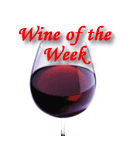
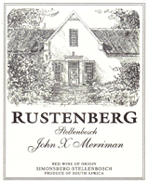

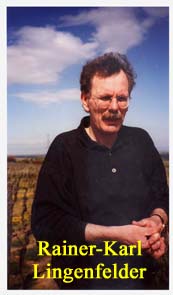 And
while that’s good news for Germany vintners who strut their wares with
considerable pride, there is no question that the plethora of names and estates
still going to intimidate. Let’s face it; Schneckenhof just doesn’t roll off the tongue. It might be better
if it were translated as “house of snails” – at least we could all
remember that one. Ditto for Juffermauer
or “wall of virgins”.
And
while that’s good news for Germany vintners who strut their wares with
considerable pride, there is no question that the plethora of names and estates
still going to intimidate. Let’s face it; Schneckenhof just doesn’t roll off the tongue. It might be better
if it were translated as “house of snails” – at least we could all
remember that one. Ditto for Juffermauer
or “wall of virgins”.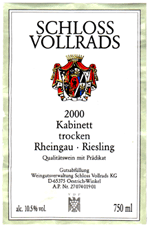 According
to the German Wine Institute, the hottest wines today are the drier “troken”
or “halb troken” whites. An exceptional example from this month’s Vintages
release is
According
to the German Wine Institute, the hottest wines today are the drier “troken”
or “halb troken” whites. An exceptional example from this month’s Vintages
release is 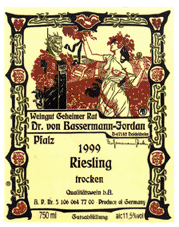 As
German wines are becoming increasingly food-friendly, the current growth of
premium drier German wines should continue. Indeed, some Toronto restaurateurs
are picking up on what is already happening in trendy upscale New York City
restaurants where crisp, bright wines like
As
German wines are becoming increasingly food-friendly, the current growth of
premium drier German wines should continue. Indeed, some Toronto restaurateurs
are picking up on what is already happening in trendy upscale New York City
restaurants where crisp, bright wines like 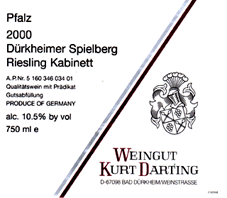 Another
winner, this time from the Pfalz, actually hit the shelves last February with
virtually no hoopla meaning that stock is still available (call the LCBO
hotline). Check out the much more youthful
Another
winner, this time from the Pfalz, actually hit the shelves last February with
virtually no hoopla meaning that stock is still available (call the LCBO
hotline). Check out the much more youthful 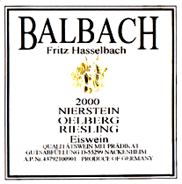 In
a recent blind tasting of nine icewines for the upcoming Vancouver Playhouse
wine festival, I was seduced by a half bottle of the golden coloured
In
a recent blind tasting of nine icewines for the upcoming Vancouver Playhouse
wine festival, I was seduced by a half bottle of the golden coloured